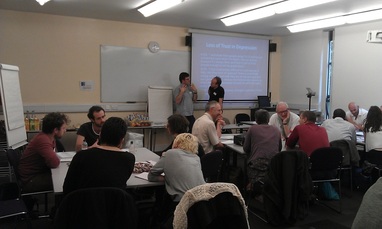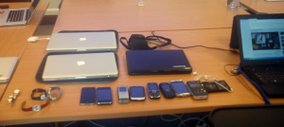 I've just finished the write up for Mobilising Community Futures, or can/should/must we do away with hope? the first workshop in a series funded by the AHRC during 2012-2013. Listen to talks from Davina Cooper (Kent), Matthew Ratcliffe (Durham) and Peter Thompson (Sheffield) and see some of the results from our collaborative sessions here.  How many clocks were in the room? How many clocks were in the room? Originally published on the Time of Encounter blog, part of an AHRC funded project exploring social aspects of time. The Time of the Clock and the Time of Encounter team met in London recently for our second workshop. It was a great opportunity for the academic team and community partners to get to know each other better and explore links between our various pathfinder projects. Johan Siebers introduced the day with a clip from Charlie Chaplin’s Modern Times and skillfully drew out some of the conflicts between mechanical clock time and personal lived time that Chaplin explores in the film. The clip from this film linked in really interesting ways to what was, for me, the key theme of the day i.e. the interplay between structure and freedom. As Anne Douglas commented, while talking about the practice of improvisation, often we see structure and freedom as threatening each other, when both actually play off each other. Over the course of the day, then, we found that the time of the clock and the time of encounter increasingly seemed to intertwine and operate in relation to each other. This interconnection between clocks and encounters came out most clearly in our discussions about time in schools (the Holmewood Schools project) and time in music (the Sounding Drawings project). When discussing the school, for example, we noted the pivotal role schools have played in training pupils to live time in a certain way. Punctuality is highly prized and days are strictly divided into work time and play time, as is the year itself. A key aim of our project is to understand how a culture of diverse temporalities might be supported by arts and humanities research and so we were particularly interested in how education policies might be reworked so that they could support multiple modes of living time, rather than enforcing a time linked closely to capitalist modes of production. However, we also discussed the way that any effort to loosen up schedules may actually be very problematic, particularly for many of the children in the Holmewood School who can find it difficult to adapt to breaks in their routines The second discussion – around time and music – was prompted by a presentation by Kathleen Coessens from the Centre for Logic and Philosophy at Scienc Vrije Universiteit Brussel. She discussed the links between time and music (explored further in her blog post here) and played us a variety of examples of experiments with timing and music. The video below illustrates one that particularly caught our imagination – a musical piece that is played entirely with metronomes. It provided a thought-provoking example of the way mechanical clock time can itself be transformed into a more creative and fluid time.
|
Archives
November 2022
Categories
All
|
 RSS Feed
RSS Feed
